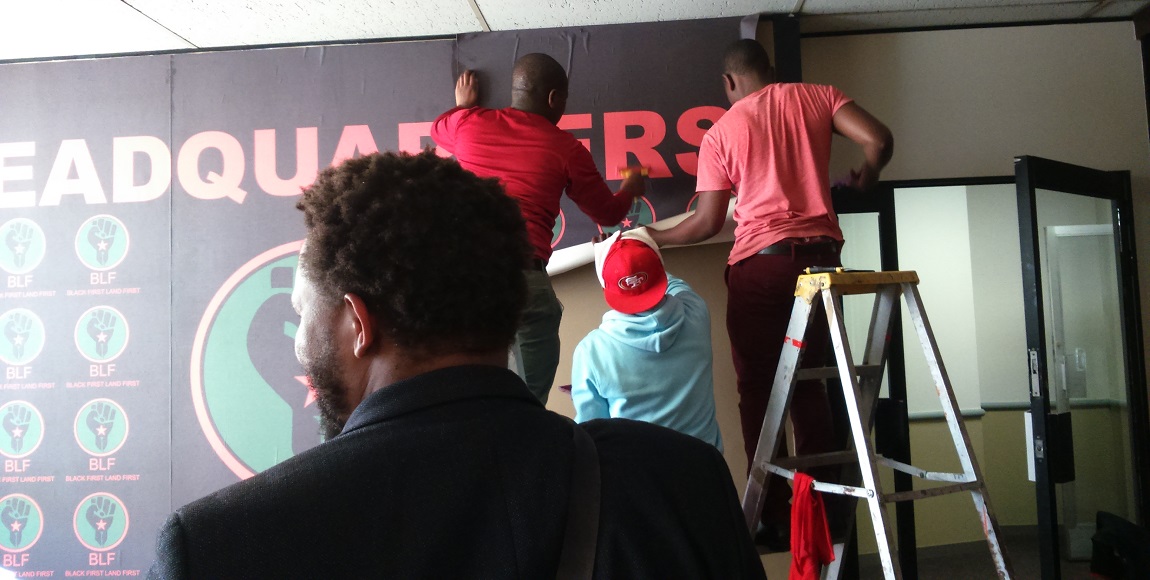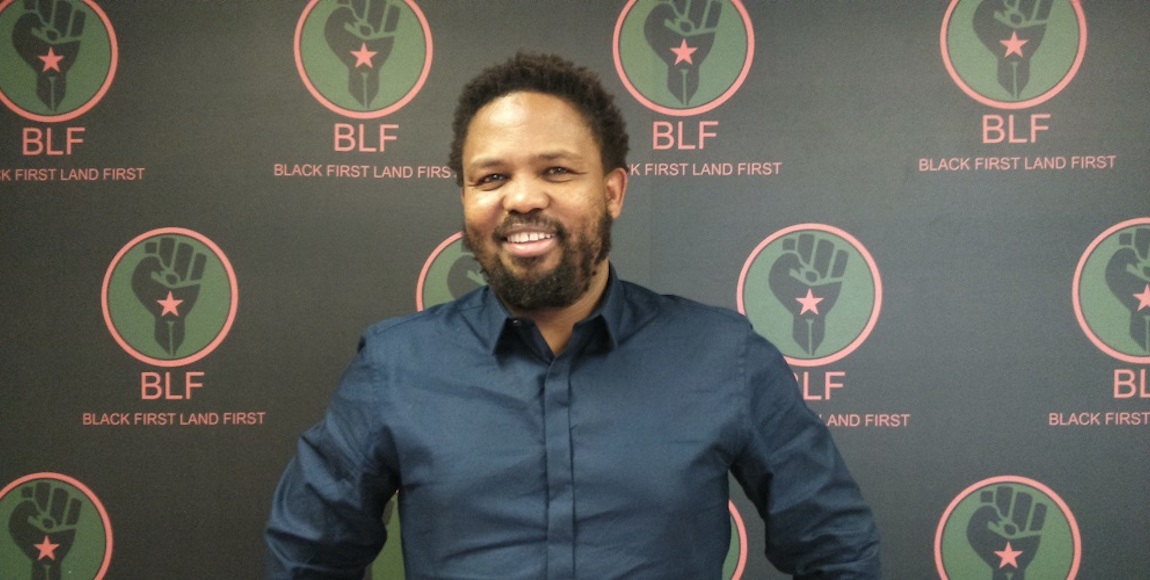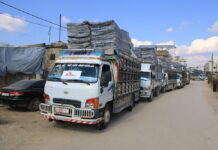Just a year into his political campaign, Andile Mngxitama has emerged as a disruptor in South African politics. He’s been labelled a political agitator by his critics, and the deputy president of the Economic Freedom Fighters (EFF), Floyd Shivambu, once called him a “chihuahua†of the elite. His movement’s website, Black Opinion, has been taken down twice, to the condemnation of free speech advocacy group Right2KNow.
We told you about Mguptama. He issa junior captive of the Guptas, and like Collen Maine, he’s handled by Nazeem Howa. Role: Chihuahua! https://t.co/J2N6xDayQG
— Floyd Shivambu (@FloydShivambu) May 31, 2017
The Daily Vox reached out to several political analysts, journalists, and politicians for perspectives on Mngxitama. All of them declined, saying they did not want to recognise him or his politics. A prominent EFF member said, “No thank you, please don’t involve me.â€
Mngxitama is self-described orthodox Bikoist centred on advancing black interests. His political platform, Black First Land First (BLF), launched just over a year ago, is deeply antagonistic to white people. At a media briefing for the BLF’s National Land Imbizo, held in May 2017, Mngxitama warned against white people attending the dialogue. “We cannot guarantee their safety,” he said. One of the BLF’s central beliefs is that the fundamental power dynamics that privilege white people are what continue the subjugation of black people. “We blacks gave the white world life and civilisation but slavery, colonialism and apartheid have put blacks last,†Mngxitama wrote in August 2015.
This view is not unique. University of Pretoria law lecturer Joel Modiri, writing in the Daily Maverick, says there’s a growing belief amongst black South Africans that the source of Africa’s problems lies in “the fundamental dynamics of injustice inherent to the capitalist, settler-colonial and white supremacist foundations of South Africa.â€
One person who was willing to speak on Mngxitama was Professor Mcebisi Ndletyana, an associate professor at the University of Johannesburg’s Institute for Pan African Thought and Conversation (IPATC). Ndletyana says Mngxitama was a legitimate activist in the land movement, working with the Azanian People’s Movement (Azapo) and the Landless People’s Movement, before he joined the Economic Freedom Fighters (EFF). But Mngxitama’s politics became a problem when he started inciting hatred against innocent people.
“He degenerated really when he became a demagogue and a chauvinist.†During the storm that hit the Western Cape, Mngxitama blamed the storm on white monopoly capital.
Last month I met with Mngxitama at the BLF’s sparsely decorated offices in Gandhi Square, Johannesburg, to talk about his role in South African politics. Mngxitama splits his time between running a publishing house and working with the BLF.
Mngxitama is surprised by the fact that no one wants to talk about him. “People don’t spare anything about me, generally. I’m so surprised only because people circulate lies about me, slander about me, and therefore don’t want to put their names on it,†he says. “The comfortable thing to do is knock me off as not important, irrelevant, instead of confronting the uncomfortable things that I’m putting on the table. It’s preferable if it’s under the table.â€
We talk about his childhood. Mngxitama was the third child in a family of 10 siblings. He grew up on a farm in Potchefstroom and went to Tlokwe High School in the North West. The school, he says, was run by racist white teachers. “One of the guys [teachers] used to carry a gun in class and the same guy one day called one of the learners a baboon in Afrikaans,†he tells me “I was surprised that there was nobody who did anything about it.â€
Angered by this, he looked for someone who could intervene. This is how, at the age of 17, he met the man who would later become his mentor, apartheid activist Bassi Gugushe.
Gugushe was a rigorous mentor who would often sign him up for debates. “He would put me in positions where we would debate with the people of the other ideological persuasions,†said Mngxitama of the man he calls “the legend of Ikagengâ€. According to Mngxitama, Gugushe was killed by another black political party at the age of 23. “It doesn’t come out. They say he was just at the shebeen and he got stabbed.â€
In 2001, Mngxitama became a founding member of the Landless People’s Movement, a social movement that wanted to speed up South Africa’s land reform process. He saw that people living in rural and informal settlements still didn’t have land and that the land reform programme was “a ruse“. “I was not putting forward a lot of black consciousness ideology into it. It was more a means-based organisation,†Mngxitama says. Through the Landless People’s Movement, he learnt that the land question isn’t just for the landless, but is also a question of blackness. “Therefore, the struggle itself has to be led by black people with all the possible skills they have, irrespective of social category differentiation.†Mngxitama says that although the movement collapsed due to insufficient ideological grounding, it influenced the BLF a lot.
The BLF and Mngxitama’s political motivation, he said, is the advancement of Black interests, informed by Steve Biko’s writings, through the reclamation of land. Any funding they get will be used to drive this campaign. The land question, he said, is a question of blackness and it is the original project of white supremacy. “We are an alienated people, alienated from the self, from the land, and alienated of course from our wealth.â€
When president Jacob Zuma announced that he’d be focussing on land reclamation without compensation during the 2017 State of the Nation address, he garnered the BLF’s support. “Zuma has in a sense defected from the ANC ideological position on this question and placed emphasis on white monopoly capital, linking closer to us than the actual ANC position,†said Mngxitama. But even if Zuma didn’t support it, Mngxitama said he would still defend him because he is a black man fighting white monopoly capital.
Mngxitama has criticised Malema for being too relaxed on this issue. “What land occupation has Julius Malema led? He has not done anything.â€
BLF and other political parties that advance black interests believe the expropriation of land is key to addressing the dispossession created by colonialism and apartheid, and economically emancipating black South Africans. “I would like to see land occupations becoming a national feature in this country,†he says. According to Mngxitama, the BLF is setting up agricultural colleges to train black people on how to run the land they are planning on occupying. Intake will begin in December and they will be starting the land occupation process in January 2018.
But SAfricans were already impoverish due to economic imbalance based on who owns what wealth nd % of minerals even b4 #statecapture.
— Thembinkosi Ngcobo (@Teevee81) August 13, 2017
But in recent months opinions towards Mngxitama and the BLF have hardened. Mngxitama’s name lost credibility when he was implicated by the #GuptaLeaks, a dossier of emails that exposed the players involved in state corruption. The dossier contains an email sent by him to the Guptas asking for funding. The BLF’s credibility was weakened when a number that sent death threats to Makhosi Khoza, a KwaZulu-Natal ANC MP that has spoken out against Zuma, was linked to the organisation. BLF has denied sending her the messages.
And then there were his Holocaust tweets.
EFF commander-in-chief Julius Malema recently told News24 that Mnxgitama was a reasonable person who had fallen into debt, and so become captured by the Guptas.
Mngxitama doesn’t deny being broke. He says he’s just like the millions of other black South Africans. “We [are] excluded!†Although he denies taking money from the Guptas, he maintains that taking money from these specific capitalists shouldn’t be a scandal. To Mngxitama, they are a segment of Black capital that will expand access to Black people. “To the extent that the Guptas are at war with white monopoly capital, they are a strategic ally of BLF,†Mngxitama has said.
White monopoly capital, says Mngxitama, is the concentration of ownership of significant economic sectors in the hands of white people. “[It] is actually a foreign force and it has externalised so much of our wealth and it continues to do so,†says Mngxitama. The term white monopoly capital has been contested by the likes of Trevor Manuel and Thabo Mbeki, who have said there is no such thing. Claims of it being invented and popularised by the infamous PR firm Bell Pottinger have done damage to the work being done to dismantle it, says Mngxitama. “For me it’s a little bit of a sore point. We have done a lot of work as BLF to make visible the invisible hand of white monopoly capital.â€
Mngxitama says the BLF has agreed they will ask the Guptas for funding. “I can now confirm to you that we are going to ask for money from the Guptas.†The logic is that the enemy of your enemy is your friend. “Already people are saying that we have got money from the Guptas. They’re hitting hard on this. Why are we bleeding when we don’t even have the money?†But, he says, they won’t accept it if it comes with caveats.
The BLF sees the Guptas as a strategic ally because both are at war with a common enemy. “We are still going to expropriate the bourgeoisie, all of it. But at this point, what do we gain from threatening white monopoly capital and the Guptas at the same time?â€
Accepting capital from the Guptas, or any other interest groups with money, isn’t a problem for the him or BLF. Mngxitama says even Steve Biko took money from white people. It’s what you do with the money that’s important. “Julius Malema takes white people’s money and then he serves their interests. That is the problem,†he says.
The BLF has been accused of being paid-for militia and a tool of the Guptas.

It’s come under fire recently for intimidating protesters outside the Gupta compound in Saxonwold in April 2017 and for harassing amaBhungane investigative journalist Micah Reddy, who has worked extensively on the #GuptaLeaks, after a TV debate. The South African Editors Forum (Sanef) won a court interdict against the BLF, which barred them from harassing journalists.
Ndletyana says: “They’re essentially mercenaries that are hired by the Gupta family to distract attention from their own shenanigans and malfeasance.†He believes Mngxitama’s political actions aren’t sincere. “A true nationalist movement would be opposed to an expatriate family that is alleged to have usurped executive authority and use our government as their own proxies for self-enrichment,†he says.
But distraction has worked for Mngxitama before. He relates an incident from two years before matric, when he was the spokesperson for the school’s SRC and worked to remove the white teachers from his school.
A rival political group from another school had come to expel Mngxitama and his other comrades. “There was chaos. We took this as an advantage to ourselves.†But they managed to convince the teachers that the rioting learners were there for them.
“The combi which used to bring them to school was turned upside down and it was being stabbed in the tank of petrol and was set alight.†In the end, the teachers fled. Mngxitama and his peers had used a crowd who had come there for them, to remove their teachers. From then the school had black teachers. “We decolonised my high school in my year and I was central in that, I’m proud to say.â€
The common perception is that the BLF are a very small though vocal group with a limited grassroots following. They’ve even been accused of paying people to join their protests. But Mngxitama says support for the BLF is growing. “[They] keep on saying to us ‘You’re doing the right thing.’â€
Mngxitama says he’s considering retiring from political activism after 2019, but the BLF will first have to reach 100 000 members. He says they currently have 50 000 official members, but this number is unaudited. Mngxitama says they’re getting there though.
He also wants the big questions around land, the economy, and education to be resolved, and to be informed by black consciousness. He said that if the land question is answered, he will retire from politics. “I’m very happy about the level of leadership… within the movement that is emerging.â€
#BLF – This is not just an image, this is an answer to those who count BLF members on fingers. We are growing.👬 pic.twitter.com/beqreLhcMM
— Asher (@desceptor) August 12, 2017
Some see Mngxitama and the BLF as contrarians to mainstream ideals who represent a more fierce version of black consciousness. Although support for this more radical perspective is growing, particularly among young South Africans, Mngxitama and his organisation’s combative and incendiary rhetoric, and their willingness to side with South Africa’s most vilified public figures, prevent them from gaining broad scale support even among those who may share some of their politics. As Ndletyana puts it, what they say they represent and what they do comes off as dishonest, leaving even potential supporters suspicious of them.
*Editors’ note: An earlier version of this story incorrectly stated the BLF’s membership numbers and that Mngxitama was a member of the Congress of South African Students. This has been rectified. We regret the errors.









